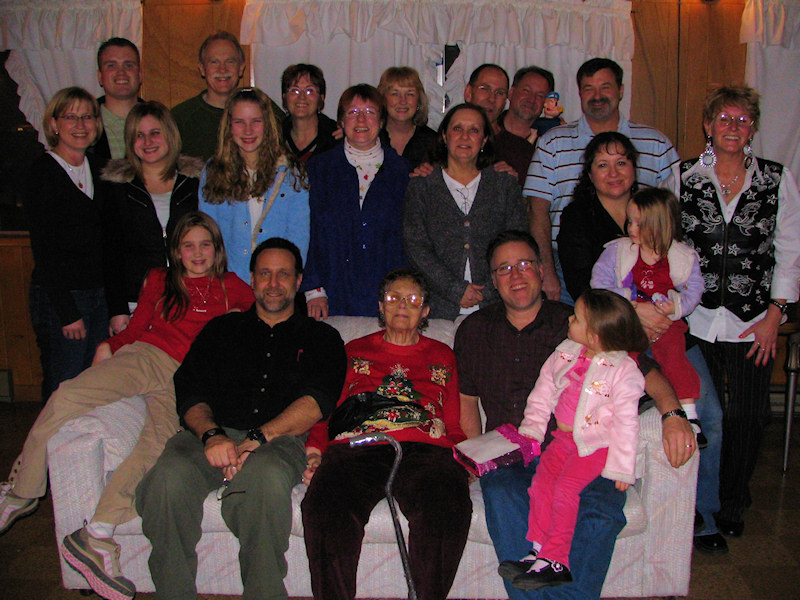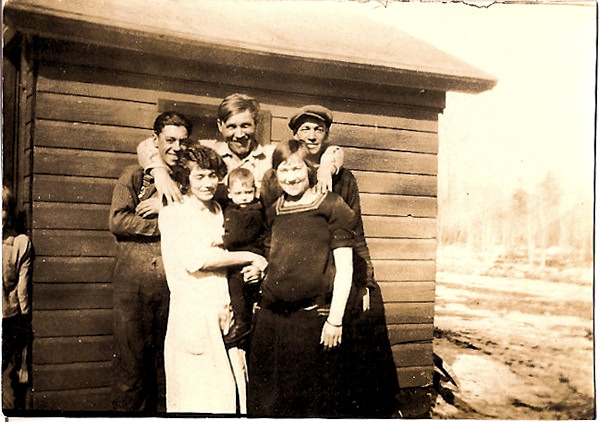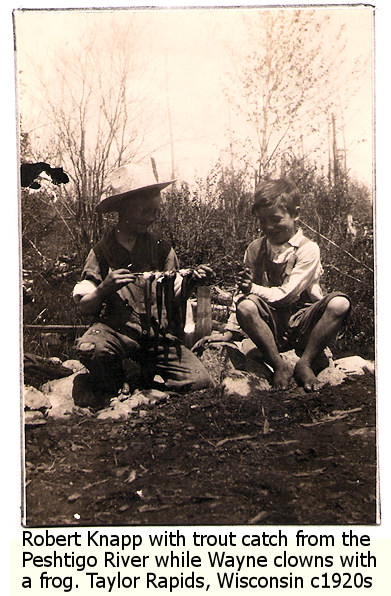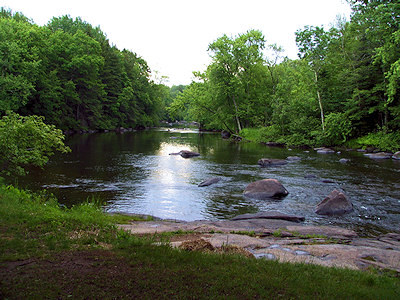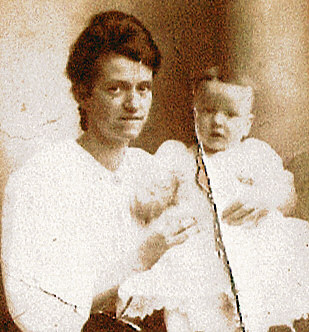In this story by Robert Knapp, he tells of when the family arrived in 1930 in Oregon as part of their Depression Era move from Wisconsin looking for work.
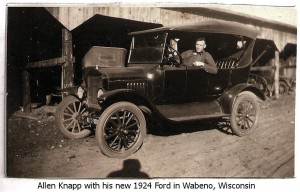 In nineteen thirty, my mother and four brothers came west from our home in Wisconsin. We stayed a few days with the Napier family, our former neighbors in Wisconsin who had moved to Oregon the year before. The Napier father and son were both employed and we thought we may be able to get work at the same place, but they were full handed. Mr. Napier had a big family to feed, so we didn’t want to wear out our welcome by staying any longer than was absolutely necessary. They already had nine children besides themselves to care for. Six more would simply be that many too much.
In nineteen thirty, my mother and four brothers came west from our home in Wisconsin. We stayed a few days with the Napier family, our former neighbors in Wisconsin who had moved to Oregon the year before. The Napier father and son were both employed and we thought we may be able to get work at the same place, but they were full handed. Mr. Napier had a big family to feed, so we didn’t want to wear out our welcome by staying any longer than was absolutely necessary. They already had nine children besides themselves to care for. Six more would simply be that many too much.
Being without much cash, the older brothers finally landed a job at some outfit about forty-five miles from Coquille that needed people to make square railroad ties. The older brothers and I had made lots of two-faced ties back in Wisconsin, but the square ones would be different.
We packed up all of our belongings, and after bidding our friend’s goodbye, we headed for this new job cutting railroad ties.
In Myrtle Creek, a small town along the way, we ran into a gravel road. Bumping along the road, the gravel soon ran out, and from there on it was plain dirt, and one way. The town of Powers was the last town on the road, the last civilization before our destination. We made a turn off the main way, following the map the fellow in charge of the job had given us. Seven miles up a very narrow, rough road we came to a big cattle ranch with cattle as far as the eye could see spread out across the field. I’d never seen so many cows in my life.
This was the Ben Gante ranch. We were advised that this would be where we would be getting all our supplies and tools to work with. Money would not be needed, as things we bought would be paid for out of our earnings.
Jack Barton, the man who had hired us was there at the ranch to greet us. He seemed to be a real fine sort of a person. He helped the older brothers to pick out the tools we would be needing. This was good as they called things different from what we knew in Wisconsin. We had never heard of a bucking saw. Back home they were called cross-cut saws. They had a handle on both ends. This darn thing had only one handle. I asked the fellow where the other handle was.
“You only use one handle on this saw!” was his answer as if that explained it all.
We looked at it, worried, then we noticed that it was much stiffer than the saws we were used to. He could plainly see that we were green-horns at the western way of logging.
Ben Gante, the owner of the ranch, was seventy five years old. He stood straight as an arrow. His drooping gray mustache, plus his matching gray hair, was the only thing about him that showed aging. As he approached us from the big ranch house, I would have taken him to be a man in his late thirties or perhaps early forties. He wore a cowboy hat, faded blue jeans, and spurs that jingled at the heels of his boots. He introduced himself with a hand-shake that nearly brought me to my knees. His voice was as powerful as he was.
“I’m Ben Gante, the owner of this here spread.” He waved his arms before letting them drop again by his sides, hands huge and worn by much work. “Jack Barton, here, has told me all I need to know about you. He says you are tie makers, and that’s good enough for me. He knows where the tools are that you’ll be needing. If you need grub, the Mrs. will take care of you all from the kitchen. Now, you know where I live, if there’s anything you besides tools and food, just let us know!”
After the old man gave us his message, he headed for the corral, where a big bald-faced pony was racing back and forth from one end of the corral to the other, stopping from time to time to paw at the ground, shaking his head and squealing to the top of his voice. Having had our share of vicious wild ponies, we were curious about how he was going to deal with this one.
While the older brothers were gathering the tools needed, Wayne and I watched the old man. He headed straight for the corral and the raging pony.
“Do you suppose that old guy is going to mess around with that awful acting pony?”
Wayne also was wondering about it. “Looks like we’re going to see pretty sudden, ‘cuz there he goes with the rope!”
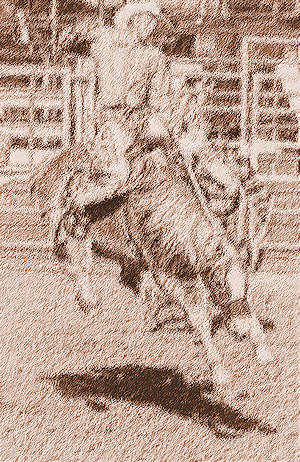 The fellow took the rope off a saddle that hung on the top pole of the corral fence. Building himself a wide loop, he swung it around his head a couple of times. As the crazy horse sped past him, the rope settled over its head in a perfect catch. With the speed of a much younger man, the old guy hurried to a post in the center of the corral, and quickly took a hitch around the post, snubbing the bronc to a stand-still. Taking up the slack, he fastened the rope with the animal’s head part way down. With very little trouble the big pony was bridled and saddled. The old man was not very big, but he tightened that since with a terrific tug. Slipping the rope from the animals neck, he put his foot in the stirrup and swung into the saddle.
The fellow took the rope off a saddle that hung on the top pole of the corral fence. Building himself a wide loop, he swung it around his head a couple of times. As the crazy horse sped past him, the rope settled over its head in a perfect catch. With the speed of a much younger man, the old guy hurried to a post in the center of the corral, and quickly took a hitch around the post, snubbing the bronc to a stand-still. Taking up the slack, he fastened the rope with the animal’s head part way down. With very little trouble the big pony was bridled and saddled. The old man was not very big, but he tightened that since with a terrific tug. Slipping the rope from the animals neck, he put his foot in the stirrup and swung into the saddle.
The fight was on! Wayne and I couldn’t take our eyes off the two. That horse made a leap into the air, he must have went straight up about five feet. He came down stiff legged, enough to jar the ordinary man out of his senses. The old man drove his spurs into the flanks of the enraged bronc screaming, “Buck! You bald-faced-son-of-a-bitch!”
Then doffing his big hat, he slapped the bronc across the ears with it. We’d never seen the like! The animal made a few more wicked jumps, then settled down to an easy gallop. By this time, the older brothers had shown up at the scene.
Melvin started running to give help, saying, “That fool horse will kill that poor old man.”
Barton stopped him. “Don’t you worry none about that ‘poor old man.’ Believe me, he can take care of himself!”
The old guy proved that to all of us. Mr. Gante rode the animal right up to us and dismounted, just as though nothing had happened. He dropped the reins and the pony stood ground, tied, as calm as you please. He could see the astounded look on our faces.
Without waiting to be interrogated, he said, “Old Baldy there, he ain’t too bad. He has a habit of trying his best to dump me on my first ride. After that first attempt he gives up. After that you can ride him all day as safe as you please! Yah see, I like Old Baldy cuz he’s a lot like myself. Comin’ in like a lion, and goin’ out like a lamb!”
It was hard to believe he was actually seventy-five years old. He told us that he rode from ten to twenty five miles every day.
We took a liking to the man right off. The only thing we didn’t like about him was the prices he charged us for tools and grub. Ranch butter in these days sold for thirty cents a pound, he charged us one dollar. Everything was sky high. He had a big regular walk-in cooler stacked with all kinds of groceries. He had almost anything you might ask for but oh, try to pay for it and you lost most your wages.
About a mile up the road from the Gante ranch was a small cabin made out of shakes. There was a cook stove and room for all to sleep. A tiny separate room was made into a bedroom for our Mother. It wasn’t much of a room, but it did give her some privacy. She did the cooking and worked hard to keep the little shack ship-shape. It was rough and a long way from our log house in Wisconsin, but it was work and we couldn’t find work back home.
On our way to the cabin, Barton led the way, pausing to stop and point to a huge rock about a hundred rods from the road. We thought it was a mountain. We all got out to get a better look at what he called Suicide Rock. He claimed that a beautiful Indian girl had climbed to the top in a fit of jealousy, and jumped to her death on the rocks below. I thought, “What a way to go!”
When we finally got to the job site and looked the situation over, it was not what we had expected. We saw the biggest trees we’ve ever seen in our lives, even though we were raised as loggers. These were Pacific Northwest trees. Some were over six feet across. Our seven foot saw was none too long. It was tough going for a while as we learned how to use the bucking saw and managed these huge trees. We were not to fall any timber. This was ok with us, because I’d hate to have had to fall any of those monsters.
In a few days we had everything under control. We made thousands of ties. After we got the hang of using that bucking saw, there was no need for Wayne and I to both do the bucking. Wayne thought he could manage that part of the work by himself. He was able to cut enough big blocks to keep the older brothers busy shaping the ties.
Barton told me that I could use a horse he supplied to drag those ties that were far from the road to a position where the trucks could reach them. I accepted the job for five cents a tie. Some had to be dragged several hundred feet. Others were very close to the road.
This was all mountainous country, so very different from what we had known in the sandy plains of Wisconsin and what we thought were huge forests. There were canyons to cross, as well as very steep inclines. In other words, it was a rough show.
In one place on the road, two large old growth cedars had been dropped across a very deep canyon. They were flattened on the upper side and lay side by side for a type of bridge. They were far enough apart so a careful driver could steer a truck across. On each edge of the logs a small pole had been spiked. I guess that was supposed to keep the wheels from running off the logs. It was probably over fifty feet across that canyon. The canyon itself was at least thirty-five feet deep. Those logs across it looked mighty small to me. The truck driver used to cross it with a full load of ties. He asked me to ride out with him on one trip, but I told him I’d just as soon walk.
Old Bird that was the name of the horse I was using to drag the ties to the road. A big old bay mare, as honest as the day was long. I used to skid as many as twenty-four ties at a time with her. As most of the skidding was down hill, it was not too much for her. The ties were dogged together one behind the other in a long string.
I kept Old Bird down by the shack when I wasn’t working her. One morning I thought I’d ride up to the job. It was about a quarter of a mile. The old horse didn’t mind in the least crossing that one log bridge. I was dragging the single tree with a chain from one tug. Things went well for the first few yards. I looked down from my perch on this big animal’s back and it looked like it was a hundred feet to the bottom of that canyon. Then it happened! My worst fears.
The single two foot wide tree got hung up on one of the fore and aft poles on the edge of the log bridge. The mare was pulled almost out of balance, and for a second or two I thought we were gonners. If you think I didn’t get a chill, well I sure did!
Naturally, she stopped, The single tree log was stuck fast. I managed to ease myself down from her back. I still don’t see how we kept from falling. I felt very bad over that deal. I should have known better than to drag that single tree. I’ll tell you one thing, I never rode that old horse across that bridge again. From then on I hung it on old Birds hame.
We worked there for a while, making ties for days upon end in the heat of summer. Then a great big forest fire was started by lightning, burning across the forest. It burned hundreds of the ties we had already made. There was no stopping it.
We were only paid for what we had hauled out, not for the work we had done. The money was little more than what our expenses were.
There was nothing to be done about it, but we were done with Oregon. A few days later, we left there and with what little money we had, we drove to Washington.
Most Recent Articles by Robert F. Knapp (1913-1994)
- Poem: Evenin' by Robert Knapp
- Poem: The Little Kids (Robert and Wayne Knapp)
- Poem: The Good and the Bad by Robert Knapp
- The 1967 Trip Back to Taylor Rapids, Wisconsin
- Poem: My Mother by Robert Knapp (Emma Primley Knapp)


